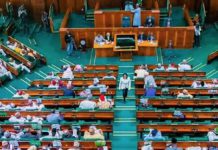The Ghana Supreme Court has upheld the decision of the Food and Drugs Authority (FDA) prohibiting celebrities from endorsing alcoholic drinks in advertisements.
Wednesday’s ruling by the Court comes in response to a lawsuit brought by Mark Darlington Osae, CEO of Black Kulcha Music, ending a highly publicised 19-month legal battle.
The court ruling means that well-known personalities and professionals are now permanently barred from appearing in advertisements promoting alcoholic beverages.
Delivering an abridged version of the ruling at the Supreme Court on Wednesday, Chief Justice Gertrude Torkornoo stated that the FDA directive does not contravene the Constitution.
The Supreme Court ruled 5-2 in favour of the FDA in this case, affirming the directive against alcoholic advertisements by celebrities.
It would be recalled that the Food and Drugs Authority (FDA) in 2015 effected a directive meant to regulate the use of alcohol among Ghanaians.
That aspect of their guidelines bars celebrities from advertising for alcoholic beverages.
The Authority had explained that due to the influential nature of these showbiz personalities, alcoholic advertisements they are involved in could push minors into alcoholism.
On November 11, 2022, Mark Darlington Osae, the manager of Reggie ‘N’ Bollie and Skrewfaze, issued a writ at the Supreme Court, describing the FDA’s 2015 regulations against alcoholic advertisements of celebrities as discriminatory against the creative arts industry.
The plaintiff, Mark Darlington Osae, a music publisher at Perfect Note Publishing, is also the Chairman and co-founder of Ghana Music Alliance, a group aimed at streamlining systems, structures and institutions of the creative industry through activism.
The writ indicates that the FDA directive which orders that, “no well-known personality or professional shall be used in alcoholic beverage advertising,” is inconsistent with and in contravention of articles 17(1) and 17 (2) of the 1992 Constitution.
He contends that Articles 17(1) and 17 (2) of the 1992 Constitution guarantee quality before the law and prohibit discrimination against persons on grounds of social or economic status, occupation, among others, and consequently null, void, and unenforceable.
Creative industry people including Wendy Shay, Shatta Wale, Brother Sammy, Kuami Eugene, and Camidoh, had all spoken against the law and had called on powers that be to repeal it, prior to the court action initiated by Mark Darlington.
According to the stakeholders of the culture and creative industries, endorsements or advertisements of alcoholic beverages are one of the very few income streams available to them at present, therefore, any law that restricts their engagement in such activities robs them of their livelihood.












